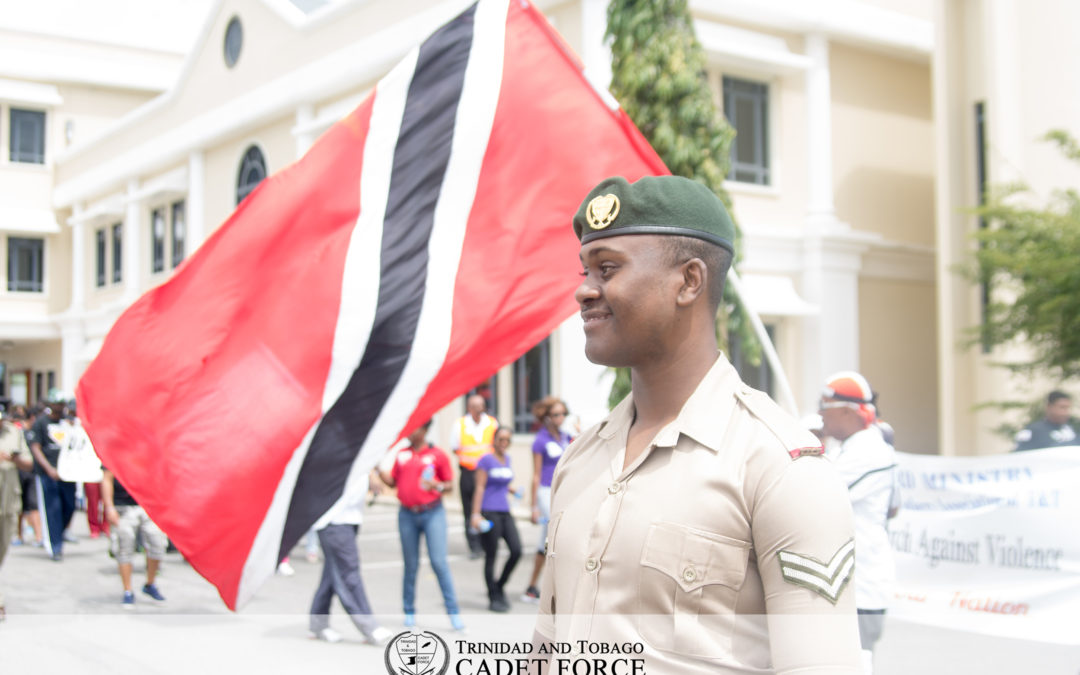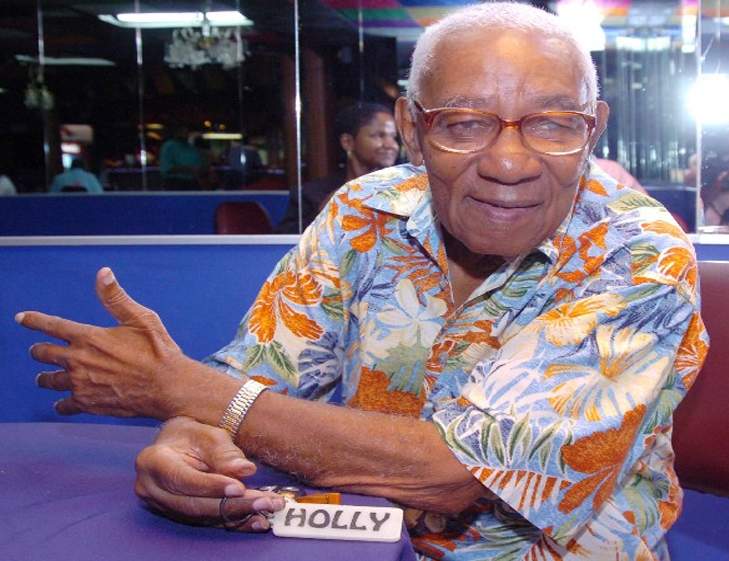
by Maurice Burke | Sep 19, 2017 | Inspiration, Letters
When I was a little boy, my hero and elder brother Peter joined the Cadet Force (TTCF). I wanted to follow in his footsteps and it helped that I knew that my father was once a soldier. When I got to Fatima College that was the one thing I wanted to do. Join the cadets. I could never have guessed the ride I was in for.
It was hard and our unit saw several ups and downs, but the lessons I learned and the amazing friends I made helped to change my life. I joined as a shy boy, who cried when he looked around and didn’t see anyone he knew, and developed into to being bold and very driven to succeed.
I’ve met several people who have spoken about the impact this organisation has had on their lives. It was amazing, however, to hear people speak about how they saw it impacting on other people’s lives.
I recall a conversation with Prof Winston Suite at UWI, who told me he could look at a class of engineering students from around the Caribbean and tell who were cadets from Barbados, Jamaica, TT etc and who were not. I have heard parents address the dramatic changes to their children, boys and girls, who joined the cadet force. The stories are amazing.
Rodney Brown always tells the story that as a teen he had a choice between what he saw as two polar opposites: cadets or a gang. He chose the cadets and now he singles that one decision as the reason he is still alive. Today he can boast of having mentored countless young people through the government youth camps, is a major and a chaplain in the TTCF, and is in full-time ministry at his church, after leaving the government service.
Similarly, I recall a young man telling me that when his parents’ marriage ended and he felt there was no reason to continue living, he relied on his unit’s officer and warrant officer (adult staff) and his fellow cadets to pull him out of that dark place.
It is not that he could rely on them for suicide counselling, but while he never let anyone know what was happening in his birth family, he substituted his adopted Cadet Force family and found the encouragement and strength to continue.
His strongest words to me were that when he was taught to overcome the obstacles in front of him in training, his officer was (inadvertently) speaking to his emotional and psychological issues. I must add that we had this conversation at his store, a well-known mobile phone store. A young person enters the Cadet Force most times at the age of 11 or 12 years old at the beginning of their secondary school career. Within a year, as they learn military type subjects, they are subjected to lessons which build confidence, initiative and leadership. By the age of 13, many of them are capable of leading and mentoring 30 or more of their peers.
By 17, they can lead 100 peers. This is no idle boast as by 17 some of them actually do lead 100 young people as a company sergeant major.
Cadets go on to be leaders wherever they go. The tested programme of developing strong citizens by using “military methods” rings true to me and countless others who were once cadets, or who have lived or worked with us.
Since its inception in May 1910, the Cadet Force has changed the lives of innumerable people who now serve as mechanics, cooks, painters, politicians, government ministers, CEOs and military personnel. This letter is a short homage to the force — and I pray it continues for 100 more years, changing lives — and the men and women who volunteer their time to mentor our young.
Thank you for stepping forward. Thank you for your service. Thank you TTCF.
First published here in the Trinidad and Tobago Newsday on Tuesday 19th September 2017

by Maurice Burke | Jan 10, 2017 | Inspiration, Letters
In 2008, I witnessed the inauguration of Barak Obama, President of the United States of America, live on television. I also witnessed its impact on my own country, the beautiful twin island nation of Trinidad and Tobago. I saw the way that St. James, a small city which usually buzzes with an almost indefatigable energy, wind down, with empty streets, as people were home watching, listening, observing his inauguration, and this inaugural address.
I have watched how the beautiful people of my twin island nation have quickly adopted new heroes, including Nobel laureates, Olympic champions, differently abled athletes and academic achievers. Indeed people all over the world constantly adopt these heroes, admiring one aspect of their lives or their achievement or another, and in some cases, admiring the entire package.
In a trip to Jamaica, I saw the images of national heroes painted on the walls of High Schools, and in the United States, one cannot help but to identify the many images they project from their currency, to status erected in public spaces.
In my own life, I have found people who have inspired me in amazing ways. My late friend and early mentor while employed at the Unit Trust Corporation, Henry Fermin, constantly reminded me that my potential was a concept of my imagination. As a teen in the Cadet Force I met countless men and women who, with their stern manner, pushed me to improve, but counselled me when I failed.
My own mother Allison Burke, my greatest inspiration, would speak with my siblings and I, and ask us to believe that we could achieve. She stood in the midst of significant challenge and exemplified strength, showing me that I could indeed, overcome whatever came my way.
Millions around the world likely watched the final address President Obama shared live, in which he spoke to his political achievements and challenges, and asked his people to rise above the negatives that pervade our global society. He told them to be wary of the dangers of the modern world, but not to give in to fear.
He encouraged them to get involved in their democracy in whichever way they could, and to stand with the man, woman, boy or girl next to them, and build the reality they want for the world.
As I looked on in awe at the flood of positive sentiments being expressed on social media while he spoke, I knew that Obama became for many, the inspiration that we all seek in life. He remains, for many watching all over the world, a person to believe in. While his presidency may have brought countless highs and lows, the man himself has become somewhat ‘larger than life’, while still pointing to the normal persons like you and me, who have a significant role to play in the lives of others.
The people need someone to believe in, and as I write these words I am reminded that the person next to me can be that inspiration, and I can be theirs. Yet still I look toward my national leaders, those in my place of work and the other organisations to which I belong in various capacities. What should we do to inspire that young person looking on at our lives, or the disenfranchised co-worker wanting to find a reason to go on?
I can’t say that I know, but I will continue to lean on the lesson my mother once shared me, when she encouraged me not to be shaken by my frustrations with my academic failures at school. Obama said the same thing, and put it succinctly. I think it is the best end to this letter.
“I have one final ask of you… that is to believe…”

by Maurice Burke | Jan 8, 2017 | Letters
In conversation with a vocal friend who works with Trinmar, the current situation with the losses of the company over the last few years is a matter which was constantly raised, but somehow never caught the public’s ear. He asserts that neither the media nor the public has ever taken it seriously.
I have also heard about the argument that the Petrotrin workers are the ones who earn the major income for the country, and as such they feel they should be rewarded for their work. As a result, the union has chosen to engage a protest, vowing to shut operations down if their members, the workers, are not offered a satisfactory increase in pay.
These arguments may not have garnered such public attention had our country’s economic outlook not been as it is. We are seeing a significant loss in income due to the drop in oil and gas prices, the decrease in production levels at the relevant companies and a severe shortage of foreign exchange.
Companies which have high import bills for products for sale have begun to raise the prices as they are unable to maintain income levels due to the shortage of US currency to purchase stock. Even in the midst of government having decreased the rate of Value Added Tax, prices have remained the same and in most cases increased, as the companies have sought to protect their enterprises.
The regular level of pay for public servants is generally low, and the same carries for employees of most state agencies. With the government being the largest employer through its ministries and other state bodies and state companies, this means that most employed persons in Trinidad and Tobago know that they are not highly paid.
It is in this context that the OWTU has drawn the ire of the public. While everyone loves to know that their friends and family members at Petrotrin are well paid, it is difficult to listen to an argument from the best paid employees in the twin island state complain that their salaries are too little. Truly we understand the nature of your job requires constant vigilance and that you work in a very high risk environment.
Similar arguments however, can be made for several other industries.
The risks may not be the same, but if there was some matrix comparing risk to remuneration, I am certain that the pay levels for these workers are far from comparable.
The situation then presents itself as though the man with one hand is complaining, and asking everyone with no hands to empathise with him. It just won’t happen.
Even in the face of this, the time is definitely not right for labour organisations to attempt to strike for increased pay.
If your argument is that a pay raise is due, then understand that just like the rest of us, these hard times may not be the right time to complain for more. If your strongest argument is that the company’s money was mismanaged, and that management enriched themselves and placed the company in a bad position, the answer is definitely not to put it further in debt. What is therefore required is a change of company direction, possibly a change of leadership and an inquiry into the practices that put the company there.
If we all took similar action, saying that “if he get I could get too” then I can safely say that we don’t have long before the entire country goes bankrupt.
It’s akin to employing a policy of “an eye for an eye”, which makes me reminisce on the quote from Ghandi which says that “an eye for an eye makes the whole world blind”. Right now, many of us wonder if the OWTU is blind to the impact of its current actions. Maybe, their eyes are just closed.
Originally published in Trinidad and Tobago Newsday

by Maurice Burke | Jun 4, 2016 | Inspiration, Letters
I recall as a child seeing Holly Beteaudier and Sham Mohammed giving away prizes on Scouting for Talent and Mastana Bahar respectively. Growing up in these times, watching television meant watching whatever was on the screen, but living in St James, a town of mixed ethnicity, that mix of programming was nothing different to the norm of everyday life.
On Scouting for Talent, however, you got that cultural mix. I recall listening to rapso in its infancy, calypso, extempo, monologues, traditional Indian dancers and singers as well as the lesser-than-normal performances such as the men who tuned milk cans and played them like steel pans, or a man who whistled while he brushed his teeth.
As Christmas approached, Holly transformed into almost an “hispanohablante” (spanish speaker), speaking the language with the likes of Daisy Voisin for the Holly B Parang Bandwagon. He was also known as a lover and fluent speaker of our local patois, and up to his passing, could be heard on I95.5fm with his show “Toute Bagai.”
From giving away Crix tins in Scouting, to giving away pearls of our history, he shared with us. From his start in radio, to his days as a presenter on TTT and his final radio appearances, he broadcasted to a willing, loving audience. From the traditional arts to the emerging arts (such as rapso) he gave us a stage. From his contributions to performance art, to our better known spoken languages (patois, spanish and trini slang) he shared the sound of our conversation.
Holly Beteaudier truly shared the depths of T&T’s culture. More than just music, dance and storytelling, he shared our festivals, language and even spoke of the nuances of our behaviour.
He shared our true culture, and we love him for it. Rest in Peace, Holly B!
First published here in the Trinidad Guardian Newspaper on Saturday 4th June 2016





Recent Comments